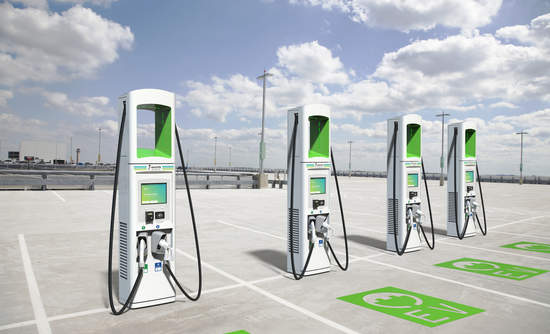Environmental awareness and an increase in electric care ownership have driven the installation of electric charging stations in parking garages.
Electric vehicle charging stations are the biggest trend in parking garages. An increase in electric vehicle ownership has created more demand for charging stations, and owners are responding to the need. The trend is true for both private owners and public owners.
“One of the trends we’re seeing is an increase in the percentage of electric vehicles over vehicles powered by gas engines,” Al Carroll, EVP of parking structures at McCarthy Buildings Co., tells GlobeSt.com. “Concerns with global warming and increasing gas prices are changing the average consumer’s preference/mindset when they’re contemplating the purchase of a new vehicle. These concerns are also driving some municipalities toward adopting higher percentages of spaces that have provisions for electric car charging stations which are requiring increased electrical capacity to operate their parking facility.”
Technology is also an important aspect of the rise in electric vehicle charging stations. “Technology is also advancing in the area of parking controls such as the use of transponders for automatic access and payment,” Carroll says. “Other advancements consist of license plate recognition cameras for better security and parking control systems that allow for the use of phone apps that can locate your car or an open parking spot.”
Today, owners are investing in electric vehicle charging stations, but some owners are looking beyond today’s driving trends. Autonomous vehicles and ride-sharing platforms could altogether disrupt parking garage usage and configurations. “While there is a wide range of speculation and opinions on this topic, some industry experts are claiming that autonomous vehicles will be here before we know it. When/if that happens, parking facilities may become merely staging areas for autonomous vehicles and transportation network companies such as Lyft and Uber,” says Carroll. “This may replace the need for gate-controlled access and pay stations with barrier-free license plate recognition payment and enforcement equipment.”
Forward-looking owners are also preparing for a downturn, which could slow ride-sharing and private vehicles. The combination of these trends has prompted owners to future-proof parking garages and make them more flexible. “This is causing some owners to consider future-proofing their parking facilities to accommodate future re-purposing in the event this were to happen,” says Carroll. “Some of the design modifications required to accommodate future repurposing of parking facilities to a different use such as office or retail space would include exterior in lieu of interior ramping; flat floors; greater floor-to-floor heights; greater live load capacities and impacts to the structure’s foundations and lateral restraint system; and MEP infrastructure.
There is a lot of talk about these changes, but so far, Carroll hasn’t seen a lot of these changes in the private sector. “While we are not seeing much traction in the private development sector, the public sector is seriously contemplating and evaluating these types of modifications,” says Carroll. “Designers and Contractors should educate themselves on the impacts of future-proofing a parking facility so they are more knowledgeable about the subject matter and can educate/advise their respective clients accordingly.”
Kelsi Maree Borland | November 11, 2019 at 02:00 PM on Globest.com

